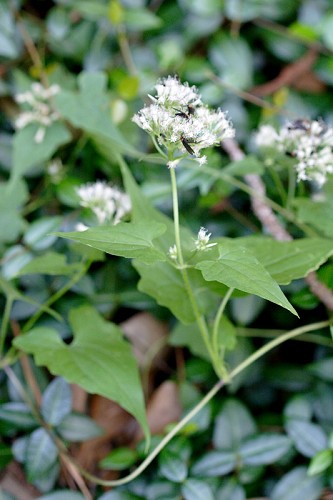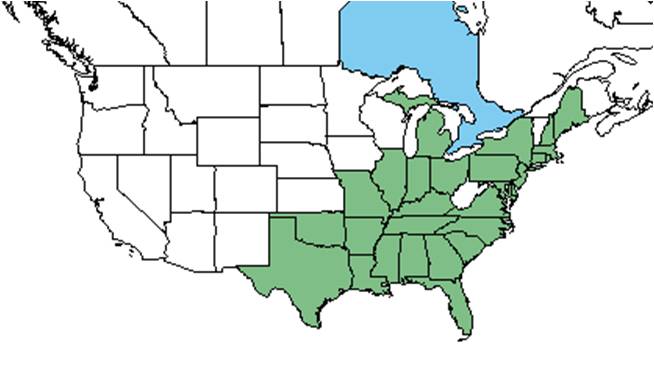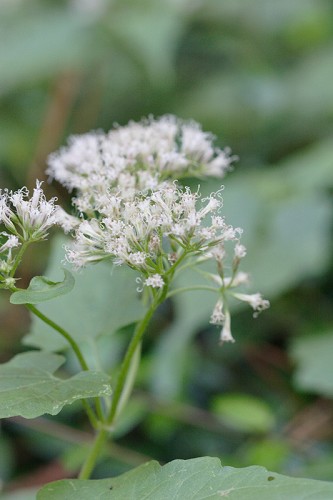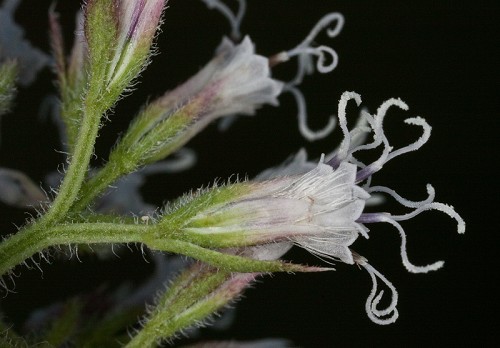Difference between revisions of "Mikania scandens"
Krobertson (talk | contribs) (→Ecology) |
|||
| Line 26: | Line 26: | ||
==Ecology== | ==Ecology== | ||
<!--===Habitat===--> <!--Natural communities, human disturbed habitats, topography, hydrology, soils, light, fire regime requirements for removal of competition, etc.--> | <!--===Habitat===--> <!--Natural communities, human disturbed habitats, topography, hydrology, soils, light, fire regime requirements for removal of competition, etc.--> | ||
| − | + | ===Phenology=== <!--Timing off flowering, fruiting, seed dispersal, and environmental triggers. Cite PanFlora website if appropriate: http://www.gilnelson.com/PanFlora/ --> | |
| + | ''Mikania scandens'' flowers from January to October and has been found fruiting in every month of the year.<ref>[www.gilnelson.com/PanFlora/ PanFlora Plant Database], Gil Nelson. Last accessed:2/12/2020</ref><ref>Gunderson, L., D. Taylor and J. Craig 1983. Report SFRC-83/04 Fire effects on flowering and fruiting patterns of understory plants in pinelands of EVER. Everglades National Park, South Florida Research Center, Homestead, Florida, 36 pg.</ref> | ||
<!--===Seed dispersal===--> | <!--===Seed dispersal===--> | ||
<!--===Seed bank and germination===--> | <!--===Seed bank and germination===--> | ||
| − | + | ===Fire ecology=== <!--Fire tolerance, fire dependence, adaptive fire responses--> | |
| + | ''Mikania scandens'' persists in frequently burned pine communities. A study on Long Pine Key in Everglades National Park found ''M. scandens'' to not vary in phenology or degree of flowering or fruiting comparing plots burned one year, two years, six years, or seven years prior.<ref>Gunderson, L., D. Taylor and J. Craig 1983. Report SFRC-83/04 Fire effects on flowering and fruiting patterns of understory plants in pinelands of EVER. Everglades National Park, South Florida Research Center, Homestead, Florida, 36 pg.</ref> | ||
| + | |||
===Pollination=== | ===Pollination=== | ||
The following Hymenoptera families and species were observed visiting flowers of ''Mikania scandens'' at Archbold Biological Station: <ref name="Deyrup 2015">Deyrup, M.A. and N.D. 2015. Database of observations of Hymenoptera visitations to flowers of plants on Archbold Biological Station, Florida, USA.</ref> | The following Hymenoptera families and species were observed visiting flowers of ''Mikania scandens'' at Archbold Biological Station: <ref name="Deyrup 2015">Deyrup, M.A. and N.D. 2015. Database of observations of Hymenoptera visitations to flowers of plants on Archbold Biological Station, Florida, USA.</ref> | ||
Revision as of 20:42, 12 February 2020
| Mikania scandens | |
|---|---|

| |
| Photo by John R. Gwaltney, Southeastern Flora.com | |
| Scientific classification | |
| Kingdom: | Plantae |
| Division: | Magnoliophyta - Flowering plants |
| Class: | Magnoliopsida – Dicotyledons |
| Order: | Asterales |
| Family: | Asteraceae ⁄ Compositae |
| Genus: | Mikania |
| Species: | M. scandens |
| Binomial name | |
| Mikania scandens (L.) Willd. | |

| |
| Natural range of Mikania scandens from USDA NRCS Plants Database. | |
Common name: Climbing hempvine
Contents
Taxonomic notes
Synonyms: Mikania scandens var. pubescens (Nuttall) Torrey & A. Gray; M. scandens var. scandens
Description
A description of Mikania scandens is provided in The Flora of North America.
Distribution
Ecology
Phenology
Mikania scandens flowers from January to October and has been found fruiting in every month of the year.[1][2]
Fire ecology
Mikania scandens persists in frequently burned pine communities. A study on Long Pine Key in Everglades National Park found M. scandens to not vary in phenology or degree of flowering or fruiting comparing plots burned one year, two years, six years, or seven years prior.[3]
Pollination
The following Hymenoptera families and species were observed visiting flowers of Mikania scandens at Archbold Biological Station: [4]
Vespidae: Pachodynerus nasidens, Parancistrocerus fulvipes rufovestris, P. salcularis rufulus
Conservation and management
Cultivation and restoration
Photo Gallery
Flower of Mikania scandens Photo by John R. Gwaltney, Southeastern Flora.com
Close flower view of Mikania scandens Photo by John R. Gwaltney, Southeastern Flora.com
References and notes
- ↑ [www.gilnelson.com/PanFlora/ PanFlora Plant Database], Gil Nelson. Last accessed:2/12/2020
- ↑ Gunderson, L., D. Taylor and J. Craig 1983. Report SFRC-83/04 Fire effects on flowering and fruiting patterns of understory plants in pinelands of EVER. Everglades National Park, South Florida Research Center, Homestead, Florida, 36 pg.
- ↑ Gunderson, L., D. Taylor and J. Craig 1983. Report SFRC-83/04 Fire effects on flowering and fruiting patterns of understory plants in pinelands of EVER. Everglades National Park, South Florida Research Center, Homestead, Florida, 36 pg.
- ↑ Deyrup, M.A. and N.D. 2015. Database of observations of Hymenoptera visitations to flowers of plants on Archbold Biological Station, Florida, USA.

